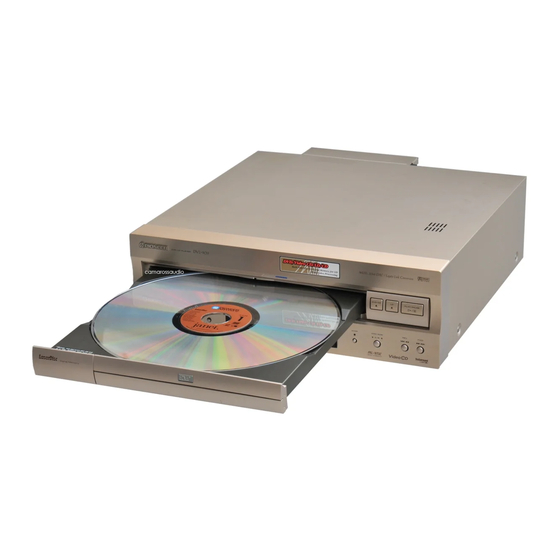Pioneer DV-505 Manuel d'entretien - Page 10
Parcourez en ligne ou téléchargez le pdf Manuel d'entretien pour {nom_de_la_catégorie} Pioneer DV-505. Pioneer DV-505 47 pages. Dvd/video cd/cd player code switchable modification
Également pour Pioneer DV-505 : Manuel d'instruction et d'installation (16 pages)

DV-505, DVL-909, DV-S9
2. CIRCUIT DESCRIPTIONS FOR DV-S9 AND DV-09
2.1 VIDEO SIGNAL PROCESSING BLOCK
2.1.1 PD0259A Block
The major purposes of the PD0259A block are;
(1) Frame-correlative cyclic digital noise reduction
(2) Horizontal and vertical contour compensation
(3) Y/C timing adjustment
(4) Frame freezing
(1) Frame-Correlative Cyclic Digital Noise Reduction
For eight-bit digital video data input to the PD0259A, noise reduction
is performed through subtraction between the data and those of the
corresponding points 1 frame before, delayed for the subtraction
via a 4-bit DRAM by 1 frame.
The noise signal detected as a result is sent to a non-linear circuit. If
the difference is larger than a specific value, it is regarded as "a
change in picture," and no canceling calculation is made.
This function is the same as that which has been performed in
conventional laser-disc players. The only difference is that the input
video signal here is a DVD digital component signal (4:2:2), while
it is an LD digital composite signal in conventional laser-disc players.
DATA
Non-linear
circuit
1-frame delay
(2) Horizontal and Vertical Contour Compensations
For data after digital noise reduction, horizontal and vertical contour
compensations are made only for the Y-signal.
Horizontal compensation is performed by detecting edge components
from the information of the reference picture elements and those
that horizontally proceed and succeed by several pixels, and then
generating edge-emphasizing components through non-linear
processing of the detected components.
Vertical compensation is performed by detecting edge components
from information on the reference picture elements and those which
vertically proceed and succeed by one line, and then generating edge-
emphasizing components through non-linear processing of the
detected components.
These edge-emphasizing components are added to the main-line
digital data to achieve contour compensations.
1H
1H
Delay
Delay
Delay
10
ON/OFF
SW
Vertical edge generation
Non-linear
HPF
circuit
Non-linear
BPF
circuit
Horizontal edge generation
(3) Y/C-timing Adjustment
This function changes the output phase of the Y signal with respect
to the Cb and Cr signals in units of the 13.5-MHz clock cycle (approx.
74 ns).
(4) Frame Freezing
In response to a command sent from the system control computer
by serial transmission, data for one frame are frozen, and the frozen
picture is output.
This function is specific to the DV-S9 and is used only for picture-
by-picture reversing by jog/shuttle operation or "Slow 1" playback
operation.
2.1.2 M65677FP Block
The M65677FP block functions as an NTSC encoder that converts
digital component signals to analog Y, C, Cb and Cr signals. While
our popular models other than the DV-S9 use the built-in encoder in
the MB86371 block, an external NTSC encoder is added to the DV-
S9, as it performs digital processing in the PD0259A block.
In addition to NTSC encoding, the M65677FP also performs:
(1) D.EXT(DV-S9)/BLACK LVL(DV-09)
(2) C.LEVEL adjustment
(1) D.EXT(DV-S9)/BLACK LVL(DV-09)
Setup of –7.5 IRE is added to the Y signal. D.EXT(DV-S9)/BLACK
LVL(DV-09) processing using analog signals in conventional laser
disc players is achieved by using digital signals.
(2) C.LEVEL Adjustments
The burst level of the C signal can be varied centering around 40
IRE.
Therefore, it is performed for the S-connector and CVBS-connector
outputs, but not for the color-difference output.
This function is also not available if the connected TV receiver has
no AGC circuit.
